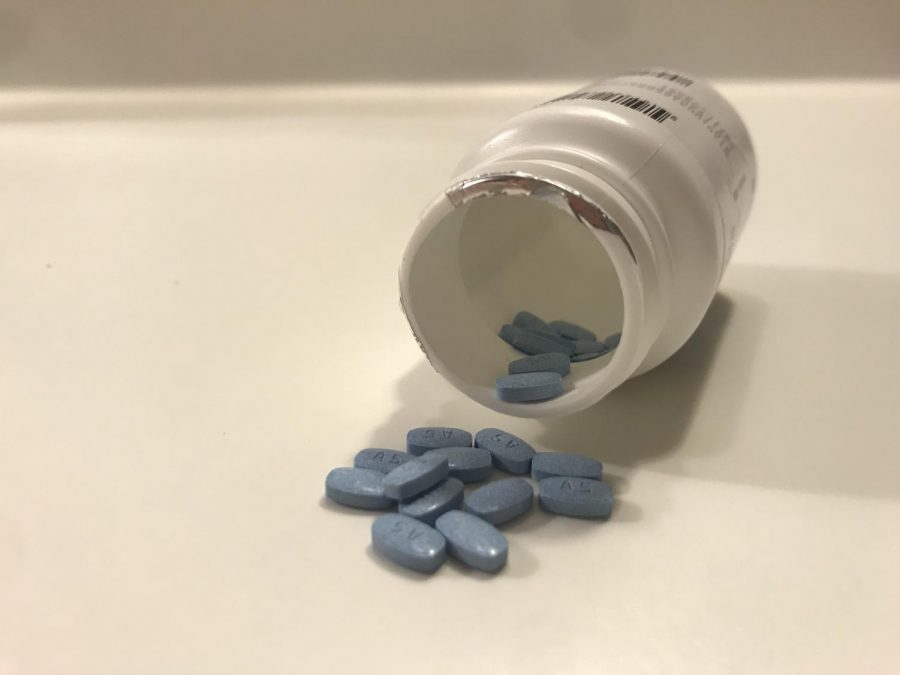Battling my Medication
Prescribed medication spilled on a plain white countertop in the bathroom.
After I slowly drag myself out of bed, I trudge up the stairs to my bathroom, switch on the light, and look at myself in the mirror, I begin my morning routine. I start by completing mundane tasks; brushing my teeth, washing my face, putting on my makeup, and doing my hair are all simple things that I complete rather quickly. When I am finished with all of that, I reach with the utmost dread towards my bottle of Abilify, push down on and turn the cap, let one of the small blue capsules fall into my palm, place it on my tongue, and wash it down with some water.
About an hour and a half after swallowing my mood stabilizer, an overwhelming wave of fatigue hits me. I struggle to keep my eyes open, pushing myself to stay awake with the knowledge that I will resent myself if I allow my body to succumb to sleep at my desk. This becomes even more strenuous when the nausea comes. Often times it hits me so quickly that the air is knocked out of my lungs and my stomach lurches, occasionally becoming intense enough that it causes me to gag.
According to nami.org, there are 29 side effects of taking Abilify, 11 of which are deemed to be serious. Among the side effects are tremors, trouble swallowing, fainting, restlessness (especially in the legs), nausea, lightheadedness, trouble concentrating, and dizziness.
It really is mind-boggling that only five milligrams of a medication designed to aid me in battling my bipolar disorder can cause so many ailments.
Though I am being medicated for a mood disorder, prescription drugs for any mental illness or disorder can have similar side effects.
In a survey of 30 RHS students, 26 of them are clinically diagnosed with a mental illness or disorder, 25 of those 26 students are being medicated for it, and 21 of those students feel physical side effects to their medication.
An anonymous RHS freshman, who is currently being treated for ADHD, stated, “[My medication] makes me feel super shaky, like I’m going to throw up, and makes me super quiet all-day.”
Admitting to yourself, your parents, and your health care providers that you are struggling mentally can be challenging. Even after a lot of social reconstruction, it has proven to be difficult to remove the taboo that has been placed around mental illness.
There have been many instances when I have had to correct someone who has tried to define me by my mental illness. This act, confining an individual into a classification system based solely on the chemical imbalances in their brain, is not only completely hurtful and ignorant, but it also robs a person of their humanity.
According to aafp.org, “An analysis of health data revealed that as many as one in six U.S. children between the ages of 6 and 17 has a treatable mental health disorder such as depression, anxiety problems or attention-deficit/hyperactivity disorder.”
I have come to recognize that so many people my age struggle the same way I do. The presence of mental illness in a person should not deem them as weak or undeserving, and people should strive to take care of themselves in whatever way is most effective for them.
So every morning, from now on, I will walk into my battle without resentment. I will breathe through the nausea and I will fight through the tremors and, no matter how physically taxing it is, I will stay awake. I will swallow my tiny, blue, five-milligram capsule with my shoulders held high, because to embrace the mental aid I am receiving I must also welcome the side effects; I urge you to be honest with yourself and do what’s best for you as well.

Emma is a senior in her second year of journalism as Marketing Manager and Staff Writer. Outside of journalism, she loves to spend time with her friends, family, and just about anyone else who can make her laugh. She is excited to grow as a writer and hopes to be a voice for others through her writing.






